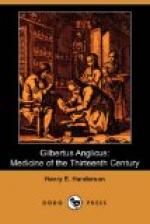Dr. Payne calls attention to the fact that all these writers antedate the 13th century, and thus limit the period of Gilbert in antiquity. This is undoubtedly true with reference to authorities actually named, but does not exclude from consideration other writers quoted, but not named, whom we shall have occasion to refer to hereafter.
The Compendium opens with a very brief and modest foreword, couched in the following terms:
“Incipit liber morborum tam universalium quam particularium a magistro Gilberto anglico editus ab omnibus autoribus et practicis magistrorum extractus et exceptus, qui compendium medicine intitulatur.”
It will be observed that no claim whatever for originality is presented by the author. He calls his book a compendium extracted from all authors and the practice of the professors, and edited only by himself. The same idea is more fully emphasized later (f. 55c), where he says:
“Sed consuetudo nostra est ex dictis meliorum meliora aggregare, et ubi dubitatio est, opiniones diversas interserere; ut quisque sibi eligat quam velit retinere.”
The self-abnegation implied in these extracts must not, however, be interpreted too literally, for the editorial “dico” on numerous pages, and even an occasional chapter marked “Propria opinio,” testify to the fact that Gilbert had opinions of his own, and was ready on occasion to furnish them to the profession. On the whole, however, the “Compendium” is properly classified by the author as a compilation, rather than an original work.
The Compendium is divided into seven books, and the general classification of diseases is from head to foot—the usual method of that day. The modern reader will probably be surprised at the comprehensiveness of the work, which, besides general diseases, includes considerable portions of physiology, physiognomy, ophthalmology, laryngology, otology, gynecology, neurology, dermatology, embryology, obstetrics, dietetics, urinary and venereal diseases, therapeutics, toxicology, operative surgery, cosmetics and even the hygiene of travel and the prevention of sea-sickness. Some of these subjects too are discussed with an acuteness and a common sense quite unexpected. Of course, scholastic speculations, superstition, charms, polypharmacy and the use of popular and disgusting remedies are not wanting. Even the mind of a philosopher like Roger Bacon was unable to rise entirely above the superstition of his age. But the charms and popular specifics of Gilbert are often introduced with a sort of apology, implying his slight belief in their efficacy. Thus in his chapter on the general treatment of wounds (f. 87a) he introduces a popular charm with the following words:
“Alio modo, solo divino carmine confisi, quidam experti posse curari omnes plagas hoc.
“Carmine.
“Tres boni fratres per viam unam ibant, et obviavit eis noster dominus jesus christus et dixit eis, tres boni fratres quo itis, etc.”




